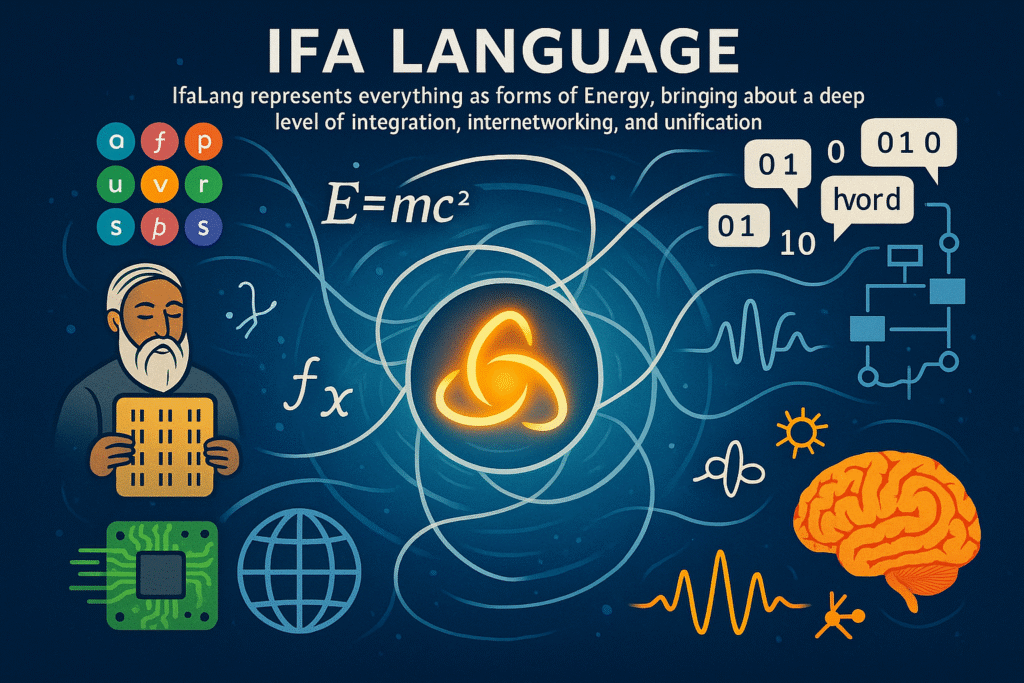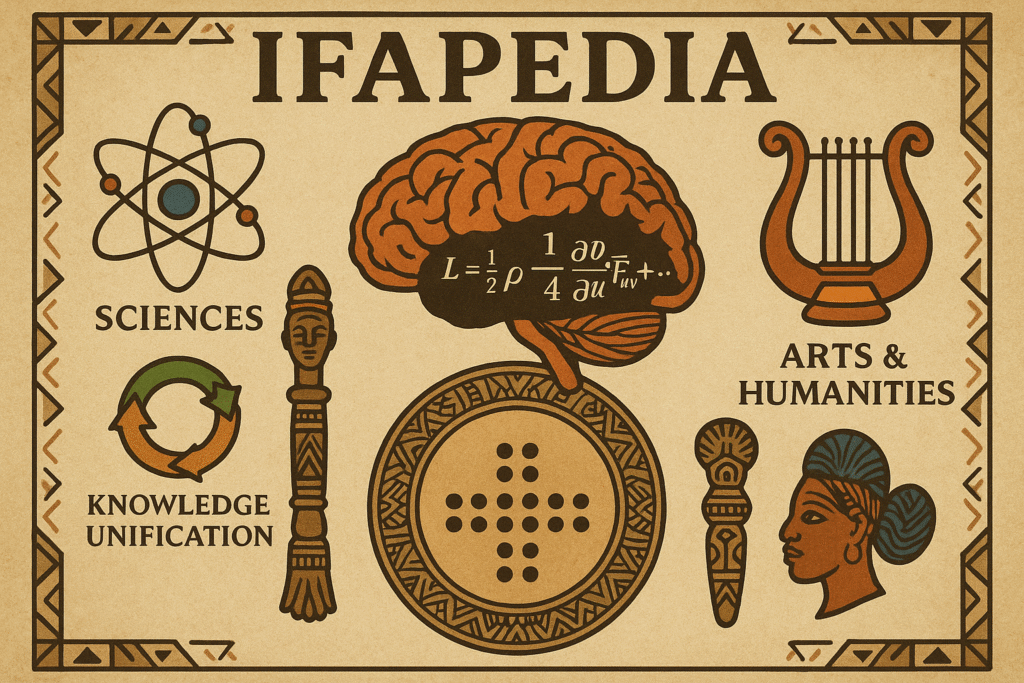
Discover iToEpedia for Comprehensive Knowledge and Insight
Ifa Encyclopedia (Ifapedia) is a meta-system that provides an integrative approach to Ifa Sciences, Ifa Arts, and Ifa Humanities, delivering accurate, decentralized knowledge that empowers informed understanding and scholarly research.
Ifapedia is the only encyclopedia in the world using mathematical methods for learning all fields and subjects in a holistic manner.
It is the encyclopedia of theories of everything (TOEs), grand unified theories (GUTs), standard models, unified theories of knowledge (TOKs/UTOKs), and unified knowledge systems (UKS).
- IFA Mathematics as the Lingua Franca of Learning
- Collaborative Wiki-Style Knowledge Building
- Structured Precision with Knowledge Graphs
- Decentralized and Consistent Information Resources
- Comprehensive Coverage of Ifa Sciences and Humanities
- Ifa Language Dictionary (IfaDictionary)
Discover Ifa Knowledge Systems (IKS): Our Integrative Knowledge Base
Learn Ifa Knowledge Convergence, showing how all kinds of knowledge originate, interact, and intersect within the Odu Ifa, which is the Theory of Everything (TOE). A key aspect of the Ifa Model of Education, the Oluwo Ifa System is the Collective of referencing systems and the foundation of all kinds of referencing systems (also called citation styles).

Foundations of Sciences
Gain insight into the Core Principles/Axioms that form the basis of all fields of science and non-science.
Artistic Expressions in Ifa
Examine creative methodologies and cultural practices within the Ifa tradition.
Ifa Humanities and Philosophy
Uncover philosophical perspectives and historical contexts shaping Ifa Humanities.
Ifa Knowledge Graph & Applications
Explore Ifa Knowledge Graph (IKG) as the underlying structure of knowledge graphs generally. Examine Ifa Graph Theory and Ifa Tree, a program in IFA Mathematics, where we learn/do Graph Theory and Tree Structure in IfaLang. Dive deep into Ifa Network Sciences and data processed/structured in IfaLang, enhancing accuracy and consistency in Ifa Information. Data processed/structured in IfaLang is Dafa (Ifa Data).
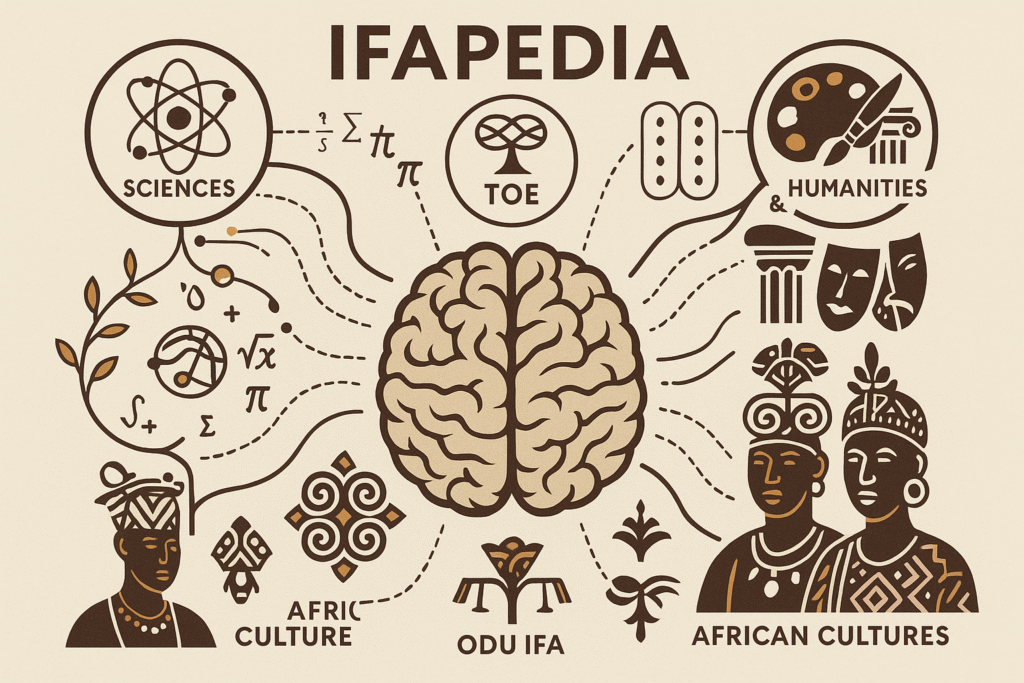
Ifa Knowledge (IK): The Octa-Dimensional Knowledge Framework
IK is the 0 + 8 D (Octa-Dimensional) Knowledge Framework — Velocity, Volume, Variety, Veracity, Value, Integration, Breadth, and Depth (5VIBD).
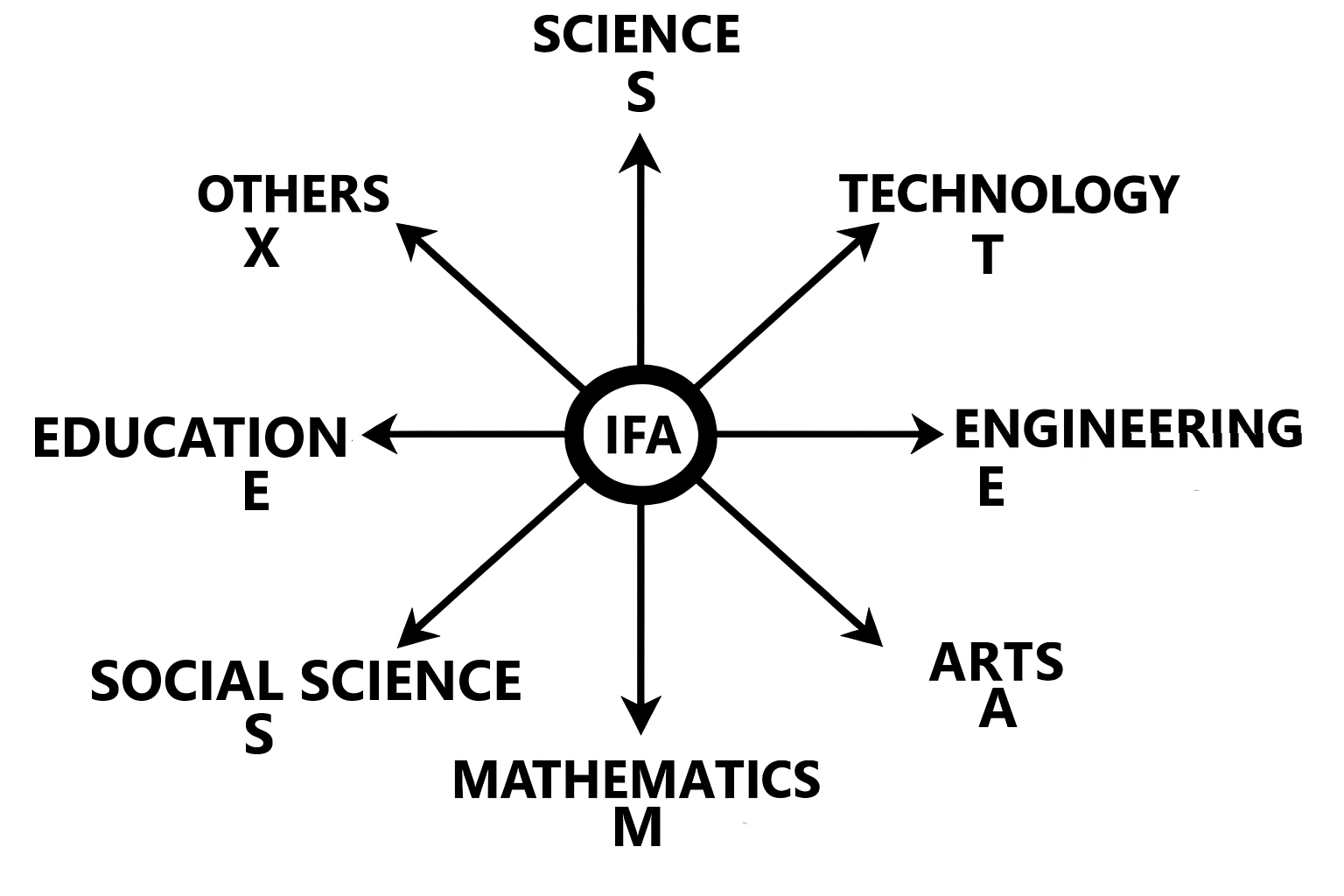
Ifa Knowledge uses Energy-based approaches to establish a new architecture for understanding reality — one designed not merely to collect knowledge, but to unify, integrate, expand, and deepen the total intellectual inheritance of humanity.
As the complexity of the modern world accelerates, knowledge systems must evolve beyond fragmented disciplinary models toward frameworks capable of coherence at planetary scale.
IK answers this need through an Octa-Dimensional structure built upon eight governing attributes:
Velocity. Volume. Variety. Veracity. Value. Integration. Breadth. Depth.
Together, these dimensions transform knowledge from a static repository into a living mathematical system capable of modeling everything.
The Five Foundational Vs
The first five dimensions describe the dynamic properties of knowledge in an age defined by exponential information growth.
Velocity refers to the speed at which data and knowledge are generated, transmitted, and transformed. Discovery is no longer episodic; it is continuous. IK is designed for a world in which understanding must evolve in near real time.
Volume captures the unprecedented scale of modern informational output — from genomic databases to astronomical surveys and global sensor networks. The challenge is no longer scarcity, but meaningful organization.
Variety acknowledges that knowledge now appears in many forms: numerical, textual, visual, symbolic, computational, and experiential. IK treats this diversity not as disorder, but as a signal of reality’s multidimensional structure.
Veracity concerns reliability. In an era of informational abundance, truth must be engineered through rigorous validation, mathematical consistency, and structural coherence.
Value represents the ultimate aim of knowledge — its capacity to generate insight, enable prediction, guide decision-making, and elevate civilization.
Yet the Five Vs alone are insufficient. Without higher-order structure, acceleration leads to fragmentation.
This is why IK extends beyond them.
Integration, Breadth, and Depth: Completing the Architecture
Integration is the gravitational center of Ifa Knowledge as all the remaining 7 IK attributes are aspects of integration in the IFA Body of Knowledge (IFABOK).
It transforms multiplicity into coherence by revealing the hidden relationships linking all domains of inquiry.
IK treats every field — physics, biology, economics, philosophy, computation, linguistics, and consciousness studies — as nodes within the unified knowledge graph called Ifa Knowledge Graph governed by deep structural correspondences, which are the 16 Principal Odu Ifa (Ifa Codes).
This Ifá-Knowledge reflects a core Principle of the Odu Ifa:
Reality is unified; fragmentation is a limitation of method.

Breadth represents the ability to traverse domains and recognize analogies across disciplines. It protects inquiry from intellectual provincialism and enables the synthesis required for paradigm change.
Depth represents penetration into the First Principles called the 16 Major Odu Ifa.
This is Ifa Polymathy, the disciplined pursuit of foundational laws, invariant structures, and generative mechanisms beneath observable phenomena through the Lens of Ifa.
Breadth expands the horizon of thought.
Depth anchors it.
Together, they cultivate the polymathic intelligence required for the emerging Integration Age.
From Data to Meta-Knowledge: The Continuum of Understanding
Ifa Knowledge operates across a developmental continuum reflecting increasing levels of structural organization.
Data forms the first layer — raw symbolic traces of measurements, events, and observations. Data records reality but does not yet explain it.
When contextualized, data becomes information, revealing patterns and relationships that reduce uncertainty.
At sufficient scale, information evolves into big data, where complexity surpasses traditional analytical tools and demands computational and mathematical inference to uncover hidden order.
Supporting this ecosystem is meta-data — data about data — which provides structure, traceability, and interpretability. Meta-data ensures that expanding knowledge remains navigable rather than chaotic.
When patterns compress into explanatory frameworks, they become knowledge: structured understanding capable of prediction, transfer, and cumulative refinement.
As disciplines converge, knowledge undergoes a phase transition into Big Knowledge or Large Knowledge Bases — not merely larger knowledge, but networked understanding across domains.
Some examples of Big Knowledge: Big Math, Big Physics, Big Linguistics, Big Sociology, and Big Commerce.
Big Knowledge is best understood as:
the search for deep invariants across all domains.
In IFABOK, these invariants are Ejiogbe, Oyeku Meji, Iwori Meji, and Odi Meji, the Four Ifa Invariants. This is Ifa Invariance.
Just as symmetry unifies physics and conservation laws govern transformation, IK provides these Four Odu Ifa, known as the Ifa-Four, as the recurring Structures that appear across all scales — patterns that connect computation with cognition, geometry with gravity, information with life, and all fields together.
At the highest level lies meta-knowledge — knowledge about knowledge — where epistemic frameworks themselves are engineered, unified, and mathematized.
A key area in metaknowlege is metascience (or meta-research), the scientific study of science itself, utilizing research methods to analyze, evaluate, and improve the quality, efficiency, and reproducibility of scientific practices.
Computational Metaphysics:
Where Breakthroughs Truly Occur
Historically, many of humanity’s greatest advances have emerged not from isolated disciplines, but from their intersections.
Modern breakthroughs occur at interfaces, not inside silos.
Information theory reshaped neuroscience.
Geometry transformed physics.
Statistics revolutionized artificial intelligence.
Computation redefined biology.
Innovation thrives where boundaries dissolve.
By structurally integrating domains, IK creates the conditions under which these intellectual collisions become not accidental, but systematic.
Discovery becomes designable.
Mathematics as the Universal Method
Ifa Knowledge employs the mathematical reasoning called IFA Mathematical Sciences as its primary instrument of inquiry, recognizing mathematics as the most precise language for describing structure, transformation, and invariance.
Within IK:
- Sciences are modeled mathematically.
- Humanities and Arts are increasingly formalized through symbolic representation.
- Technologies are expressed as computable architectures.
- Philosophical claims are examined through logical coherence.
Mathematics functions not merely as a tool, but as the universal grammar of intelligibility.
To model knowledge mathematically is, ultimately, to move closer to modeling reality itself.
Ifa as the Model of Everything (ModeloE)
Ifa-Knowledge, advances beyond interdisciplinarity toward a more ambitious horizon: the systematic modeling of everything.
This pursuit is called Ifa Modelling or ToE Modelling and does not reduce complexity; it reveals the Deep Symmetries called Ifa Symmetries or Oju Odu Ifa Merindinlogun (16 Principal Ifa Codes) that generate it.
When knowledge is properly integrated:
- Biology begins to resemble computation.
- Intelligence resembles optimization.
- Physics resembles geometry.
- Consciousness invites formal description.
Patterns repeat across scale because structure itself is recursive.
IK is designed to detect those recurrences — and to organize them into a coherent map of understanding.
Ìmọ̀fá: Ìmọ̀jìnlẹ̀, Ìmọ̀rìnlẹ̀, Ìmọ́fẹ̀, Ìmọ̀gbogbo-ǹkan
IfaKnowledge: Unified, integrated, wide, and deep — an octa-dimensional framework designed to expand the boundaries of what humanity can know, model, and become.

The Ifa Binary Knowledge System: Ifa & Orisa Knowledge (IOK)
At the deepest structural level of IfáKnowledge lies a generative duality — a binary architecture that reflects one of the most fundamental principles observed across mathematics, physics, computation, and metaphysics:
complexity emerges from structured pairs.
The Ifa Binary Knowledge System (IFABOK) formalizes this principle through the dynamic partnership between two complementary epistemic frameworks:
- Ifa Knowledge System (IKS)
- Orisa Knowledge System (OKS)

Together they form Ifa and Orisa Knowledge (IOK), collectively IFABOK, Ifa-Orisa Knowledge System (IOKS), or IFA Internet — a Unified Binary Engine designed to model reality through balanced intellectual forces.
Ifa Binary: The IfaBinaries are the 256 Odu Ifa (Ifa Codes), powering Ifa Computers.

Orisa Binary: The OrisaBinaries are the 16 Odu Orisa, the Ẹ́ẹrìndínlógún (Oosa Codes), powering Oosa Computers.

A Mathematical Duality
The relationship between IKS and OKS is not merely symbolic or cultural; it is structural.
It reflects the recurring Truth known as Odu Ifa in Yoruba that underlies modern scientific knowledge systems:
- wave and particle
- discrete and continuous
- symmetry and transformation
- logic and intuition
- stability and emergence
Ancient binary architectures such as IOKS are generative because they create tension without contradiction — a condition from which higher-order structure arises.
In this sense, IFABOK embodies a principle often encountered in modern science:
duality is not division; it is a mechanism of creation.

Orisa Knowledge System (OKS): The Super Partner
The Orisa Knowledge System functions as the dual — and super-partner — of the Ifa Knowledge System.
Where IKS emphasizes formal structure, mathematical modeling, deep invariants, and integrative logic, OKS expands the epistemic field by engaging domains often resistant to purely reductionist analysis, including:
- intuitionism
- emergence
- embodiment
- creativity
- symbolic cognition
- relational intelligence
- adaptive complexity
OKS ensures that the pursuit of unified knowledge does not collapse reality into sterile abstraction. Instead, it preserves the dynamism necessary for living systems.
If IKS provides architectural precision,
OKS provides generative vitality.
Together they produce a knowledge system (IOKS) capable of both rigor and evolution.
Grounded in the Deep Metamathematics of the Odu Ifa
The binary structure of IFABOK reflects the profound combinatorial logic embedded within the Odu Ifa called Àmúlù in Yoruba, whose configurations demonstrate that vast interpretive universes can emerge from elegantly simple generative rules.
Much like binary code underlies modern computation, the Odus (Deep Codes) reveal how structured dual states can scale into immense knowledge architectures.
This is not merely analogy — it is methodological inspiration.
From a mathematical perspective, the Odus illustrate that:
- finite symbolic elements can generate infinite interpretive space
- recursion produces depth
- combinatorics produces diversity
- structure enables prediction
IFABOK extends this insight into a universal and deep epistemology called Ifa Epistemology that allows you to learn all fields using mathematical methods.
Beyond Either/Or: Toward Complementarity
The Ifa Binary Knowledge System should not be mistaken for opposition. Its purpose is synthesis.
IKS without OKS risks excessive abstraction.
OKS without IKS risks epistemic diffusion.
Their union produces coherence.
This reflects a broader intellectual transition now unfolding across advanced research:
The future of knowledge is not polarized — it is complementary. This is the Ifa Principle called Tibi Tire Èjìwapọ̀ in Yoruba.
Just as modern physics required reconciling wave and particle descriptions, the next era of understanding demands frameworks capable of holding multiple modes of knowing within a single architecture.
IOKS is designed for precisely this grand quest.
A Generative Engine for Big Knowledge
Within the Octa-Dimensional framework, IFABOK acts as the knowledge generator called Ifa Generator (IfaGen)— a System capable of continuously producing new intellectual structures through the interaction of its Dual Cores, the Ogbe-Oyeku Pair (Energy-Anergy System):
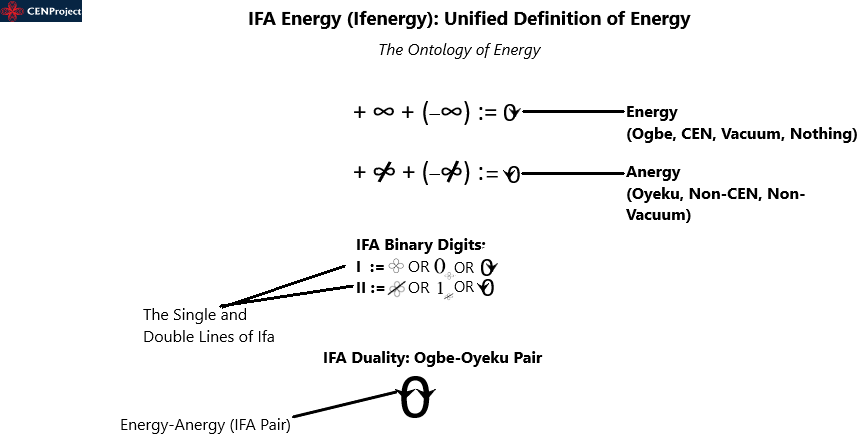
By maintaining productive tension between formalization and intuition, IFABOK supports the search for deep invariants while remaining open to novelty.
It therefore aligns naturally with one of the central ambitions of Ifa Knowledge:
to move humanity from fragmented knowing toward unified intelligibility.
Binary Foundations, Infinite Horizons
Across computation, binary code produces the digital universe.
Across mathematics, dualities reveal hidden symmetries.
Across physics, complementary descriptions unlock deeper laws.
All this is based on the ancient Binary Sciences of the Odu Ifa discovered and developed in the ancient eras by Orunmila (Ifa) and the Orisas collectively called Ọ̀kànlénírínwó Irúnmọlẹ̀ (401 Primordial Forces/Energies).
IFABOK situates Ifapedia within this Grand Ifa and Orisa tradition, which is also a recurring element in modern STEM, by recognizing that the architecture of knowledge itself benefits from generative pairing.

The result is neither rigid nor diffuse, but structurally alive.
Ifa and Orisa Knowledge (IOK) together form a binary epistemic foundation for the Integration Age — a system rooted in the deep mathematical properties of the Odu Ifa and designed to support the emergence of Big Knowledge at civilizational scale.
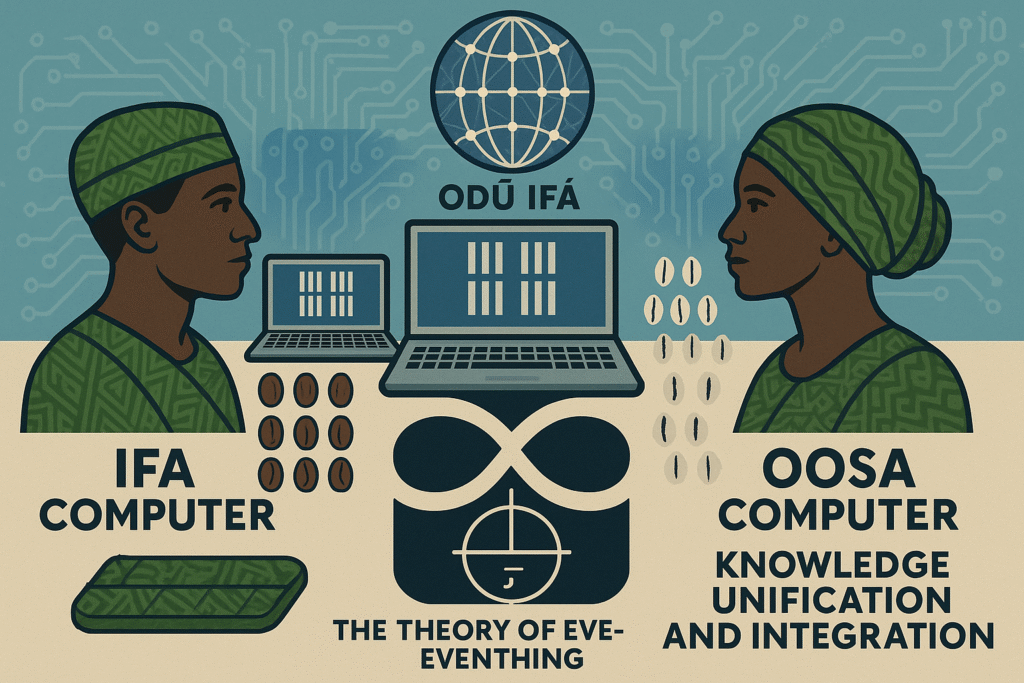
What is Ifapedia and its purpose?
Explore detailed insights into Ifapedia’s role as an integrative platform for Ifa Sciences, Ifa Arts, and Ifa Humanities.
How does Ifapedia ensure information accuracy?
By combining wiki collaboration with a structured knowledge graph, Ifapedia maintains reliable and consistent data.
Who can contribute to Ifapedia’s content?
Anyone interested in Ifa knowledge can participate, fostering decentralized expertise sharing.
What types of resources does Ifapedia offer?
It provides encyclopedic entries, multimedia resources, and scholarly references on Ifa traditions.
How is Ifapedia structured for user accessibility?
The platform features intuitive navigation and search powered by its knowledge graph architecture.
